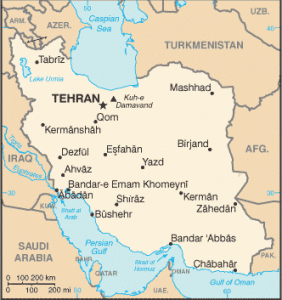Iran’s oil minister on Saturday called for an emergency OPEC meeting in response to oil prices falling below $100 per barrel, saying the current market value of oil has become “illogical.”
 The oil minister, Rostam Ghasemi, said that at a recent meeting of the Organization of the Petroleum Exporting Countries, member states agreed to hold an emergency meeting if oil prices fell below $100 per barrel. On Friday, they seemed to dip below that mark.
The oil minister, Rostam Ghasemi, said that at a recent meeting of the Organization of the Petroleum Exporting Countries, member states agreed to hold an emergency meeting if oil prices fell below $100 per barrel. On Friday, they seemed to dip below that mark.
Ghasemi warned of disorder in the market if OPEC members do not observe their quota and the production ceiling of 30 million barrel per day. Iran is the second largest producer of OPEC and earns about 80 percent of its foreign revenue from exporting crude
But Iran has been hit hard by Western sanctions heaped on the Islamic Republic in order to stoke internal discontent and pressure them into making absurd concessions in recent international negotiations over Iran’s civilian nuclear program.
However, Iran’s central bank governor, Mahmoud Bahmani, has reportedly said that Iran has been “easily” able to sell oil despite the economic warfare from the US and European Union. The State Department has provided waivers to escape the embargo on Iranian oil for China, India, Japan, Malaysia, South Korea, Singapore, South Africa, Sri Lanka, Turkey and Taiwan, although the waivers come with a promise to reduce imports.
Possibly contributing to the decrease in prices is the increase in output that Saudi Arabia has intentionally set in motion in response to the international sanctions regime on Iran.
The centrality of oil markets in the US confrontation with Iran is instructive here. Much of the conflict is based on a power play from Washington to try to neuter Iran’s regional influence and make them obedient.
In a secret memo on Iran written in 1982 to the National Security Council, this centrality was spelled out. “The importance of the Gulf region to the US resides largely in its oil,” said the memo. “The power to interrupt the supply of this [oil] flow entails the power to wreak havoc on the economies of the west.”
The memo explains “whoever is in control of the Gulf’s” oil, “is in a position to have a very large political as well as economic influence in the world.” Iran’s war with Iraq at the time raised concerns in Washington that a possible Iranian victory could lead it to “exert influence” over Iraq and Kuwait and even Saudi Arabia.
“We may soon be faced with a situation,” the memo continues, “in which a significant portion of the oil supplies to the West are heavily influenced by Iran or by political forces hostile to the West or by forces unable or uninterested in maintaining the flow of oil.”
The same fundamental calculus remains today. Sanctions in response to Iranian achievement of nuclear capability elicits such a strident response from the US not because of any fears that Iran would use the bomb, but because that sort of deterrent helps eliminate Washington’s “avenues for regime change” and thus increases Iran’s leverage over US attempts to maintain dominance in the Middle East.



